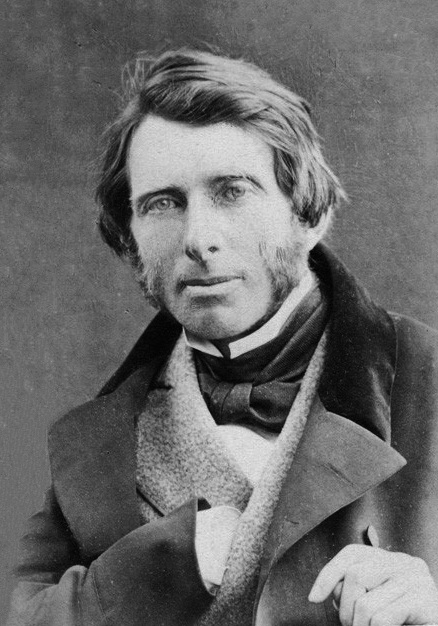architecture is the art which so disposes and adorns the edifices raised by man, for whatsoever uses, that the sight of them may contribute to his mental health, power, and pleasure
The Seven Lamps of Architecture - Página 7 http://books.google.com/books?id=yxscPx9aLM8C&pg=PA7, de John Ruskin - Publicado por Wiley, 1865 - 186 páginas
John Ruskin Frases famosas
“Acho que a primeira prova da grandeza de um homem é a sua humildade.”
I believe the first test of a truly great man is his humility
The True and the Beautiful in Nature, Art, Morals, and Religion - Página 338 http://books.google.com/books?id=zz5LAAAAMAAJ&pg=PA338, de John Ruskin, L. C. Tuthill - Publicado por John Wiley & Son, 1867 - 452 páginas

Citações de homens de John Ruskin
Variante: A maior recompensa para o trabalho do homem não é o que se ganha, mas o que ele nos torna.
In health of mind and body, men should see with their own eyes, hear and speak without trumpets, walk on their feet, not on wheels, and work and war with their arms, not with engine-beams
The Works of John Ruskin: Praeterita. 1886-87 - Volume 22 - Página 367, John Ruskin - Allen,1887
John Ruskin frases e citações
Variante: Dificilmente existirá alguma coisa neste mundo que alguém não possa fazer um pouco pior e vender um pouco mais barato. E as pessoas que consideram o preço somente, serão suas merecidas vítimas.
“A esperança deixa de ser felicidade quando acompanhada de impaciência.”
Hope herself ceases to be happiness when impatience companions her.
The Ethics of the Dust: Ten Lectures to Little Housewives on the Elements of Crystallisation, página 61 https://books.google.com.br/books?id=pzlcAAAAcAAJ&pg=PA61, John Ruskin - John Wiley & Son, 1866 - 250 páginas
Variante: A própria esperança deixa de ser ventura quando a impaciência a acompanha.
John Ruskin: Frases em inglês
Sesame and Lilies, lecture I: Sesame. Of King's Treasuries, section 3 (1864-1865)
Fonte: The Seven Lamps of Architecture (1849), Chapter VII: The Lamp of Obedience, section 1.
Fonte: Dictionary of Burning Words of Brilliant Writers (1895), P. 134.
Fonte: The Seven Lamps of Architecture (1849), Chapter IV: The Lamp of Beauty, section 19.
Mornings in Florence, part III, section 49 (1875).
“An unimaginative person can neither be reverent nor kind.”
Fors Clavigera, letter xxxiv (October 1873).
Fors Clavigera (1871-1878 and 1880-1884)
Lecture V, section 82.
The Eagle's Nest (1872)
“Life without industry is guilt, and industry without art is brutality.”
Lecture III
Lectures on Art (1870)
Fonte: Dictionary of Burning Words of Brilliant Writers (1895), P. 122.
Volume III, part IV, chapter XII (1856).
Modern Painters (1843-1860)
Volume V, part VIII, chapter 1, section 4 (1860).
Modern Painters (1843-1860)
Known as the Common Law of Business Balance, this quotation has been widely attributed to Ruskin but has never been sourced to any of his works.
[Shapiro, Fred R., The Yale Book of Quotations, 2006, Yale University Press, New Haven, 657]
Disputed
Fors Clavigera, letter xxxvii, (1 January 1874).
Fors Clavigera (1871-1878 and 1880-1884)
Fonte: Dictionary of Burning Words of Brilliant Writers (1895), P. 438.
The Crown of Wild Olive, lecture I: Work, sections 23-24 (1866).
Time and Tide, letter VIII (1867).
Volume III, part IV, chapter XVI (1856).
Modern Painters (1843-1860)
Volume II, part III, chapter V (1846).
Modern Painters (1843-1860)
Cestus of Aglaia, chapter VI, section 72 (1865-66).
Preface to the first edition, 1865
The Ethics of the Dust (1875)
“The work of science is to substitute facts for appearances, and demonstrations for impressions.”
Volume III
The Stones of Venice (1853)
Volume II, chapter VI, section 62.
The Stones of Venice (1853)
Fonte: Dictionary of Burning Words of Brilliant Writers (1895), P. 405.
Lecture V, section 88.
The Eagle's Nest (1872)
Volume III, part IV, chapter VII (1856).
Modern Painters (1843-1860)
Fors Clavigera, letter lxxvi (4 March 1877).
Fors Clavigera (1871-1878 and 1880-1884)
Volume V, part VIII, chapter I, section 2 (1860).
Modern Painters (1843-1860)
